Events
From Kazakhstan to Italy: A General Assembly of the Lithuanian Academy of Sciences
24 09 2023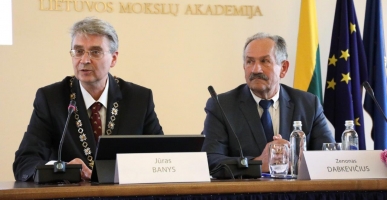
On 19 September, a general assembly of the members of the Lithuanian Academy of Sciences was convened in the Grand Hall of the Academy, which was also attended by Prof. Kunsulu Zakarya, President of the National Academy of Sciences of the Republic of Kazakhstan under the President of the Republic of Kazakhstan, its Vice President Dr Lyazzat Yeraliyeva, the new elected foreign members of the Lithuanian Academy of Sciences, heads of embassies, and the winners of the Young Scientist Scholarship Competition, which is organised by the Lithuanian Academy of Sciences. At the beginning of the meeting, after adopting the agenda on the proposal of Jūras Banys, President of the Lithuanian Academy of Sciences, a minute's silence was observed in honour of Calyampudi Radhakrishna Rao, a foreign member of the Academy.
The meeting continued with the solemn ceremonies. Colleagues wished all the best to Prof. Vytautas Ostaševičius on the occasion of his 75th birthday. The ceremony of awards to the winners of the Young Scientist Scholarship Competition followed. Young scientists were presented with scholarship certificates. In 2022–2023, three scholarships were awarded in the field of the humanities and twelve in the natural, medical, health, agricultural, and technological sciences.
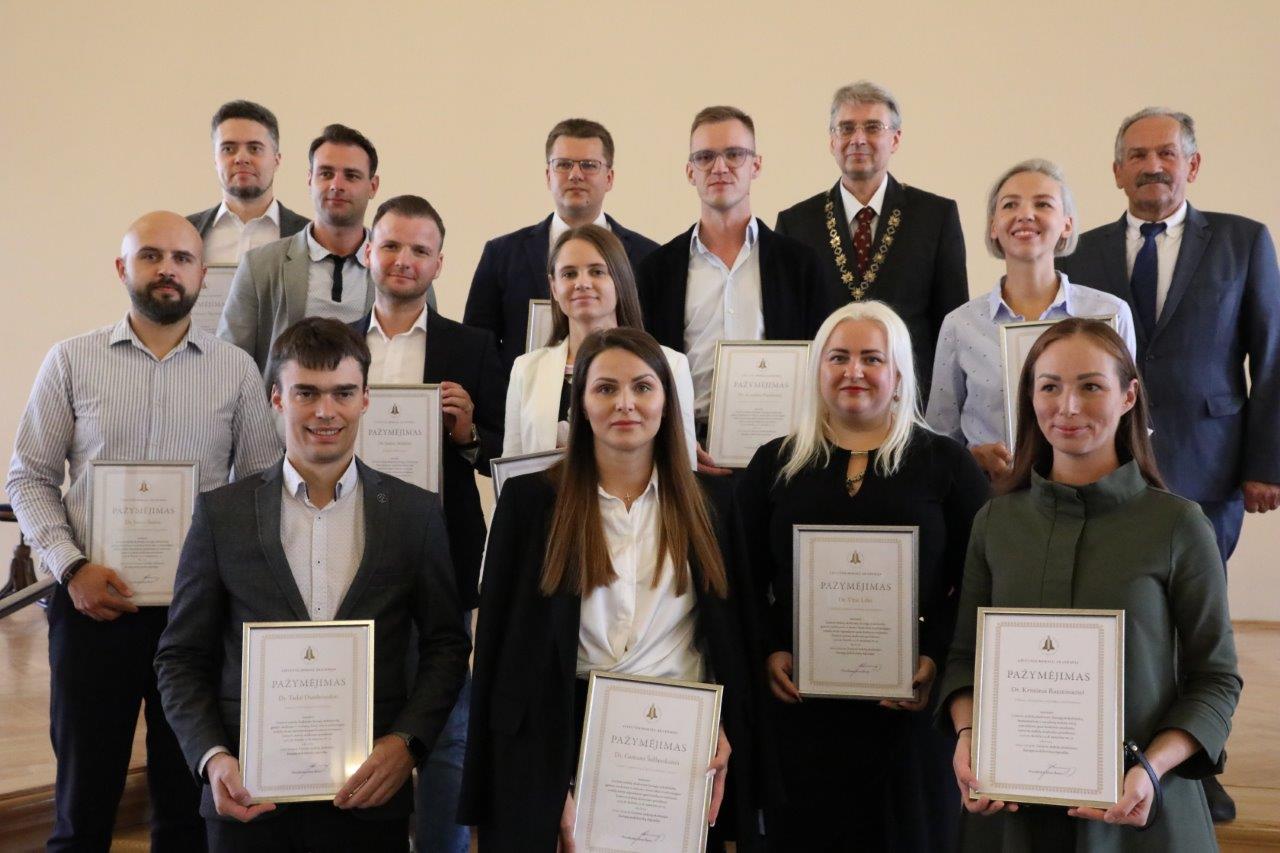
This ceremony was followed by President Banys giving a presentation on the development of international cooperation in the Lithuanian Academy of Sciences. He reminded the participants in the assembly that the category of the foreign member of the Lithuanian Academy of Sciences was introduced in 1990. Since then, the foreign members of the Academy have been regularly visiting Lithuania, taking an active part in the work of the Academy, giving lectures, and conducting joint projects with Lithuanian scientists. Nobel laureates Prof. Gérard Mourou of laser physics and economist Prof. Robert J. Schiller are among the Academy’s foreign members.
For several years, the Academy has been organising various international conferences and participating in international associations (ALLEA, EASAC, etc.). It has a number of agreements with foreign academies, one of the most recent of them being the cooperation agreement with the Academy of Sciences and Humanities in Hamburg. In total, links have been established with 26 foreign academies of sciences and the Council and Foundation of Lindau Nobel Laureate Meetings. Until 2022, the Lithuanian Academy of Sciences coordinated the activities of Lithuanian researchers at CERN. The Academy takes part in the organisation of the Baltic conferences of intellectual cooperation, which are held every two years. It recommends experts based on the needs of international academy networks, cooperates with such international scientific societies as the European Physical Society, is a partner of the L'Oreal-UNESCO For Women in Science Awards Programme, and supports struggling Ukrainian scientists in various ways. Members of the Young Academy of the Lithuanian Academy of Sciences are also very active: they participate in the SAPEA (Science Advice for Policy by the European Academies) consortium of European academy networks and in other international organisations. The scientific journals published by the Academy reach scholars in over 30 countries.
Before the signing of the Memorandum of Cooperation, Prof. Zakarya, President of the National Academy of Sciences of the Republic of Kazakhstan, introduced the organisation and talked about Kazakhstan's research priorities. After the reorganisation in 2023, ten such priorities were established. The country has 414 research and R&D institutions. The aim is to strengthen the country’s intellectual research potential. It is interesting to note that as many as 52% of the country’s researchers are women. According to the data of 2022, Kazakhstan has 22,456 research staff and 18,014 researchers, of whom 46% are young researchers under 40. Over the past five years, Kazakh scientists have achieved a number of successes, including the development of five vaccines against COVID-19 and a computational system (Q-Symphony High-Performance Bioinformative Computing) for the analysis of genomic, transcriptomic, exome and other biomedical data. The country is operating the Tokamak fusion reactor, has developed fast-charging super-batteries, etc. Over 1000 young scientists work in expert groups. In her closing remarks, Prof. Zakarya thanked the Lithuanian Academy of Sciences for its attention and stressed her institution's willingness to collaborate for the sake of scientific excellence.
At the end of this presentation, a Memorandum of Cooperation was signed between the Lithuanian Academy of Sciences and the National Academy of Sciences under the President of Kazakhstan.
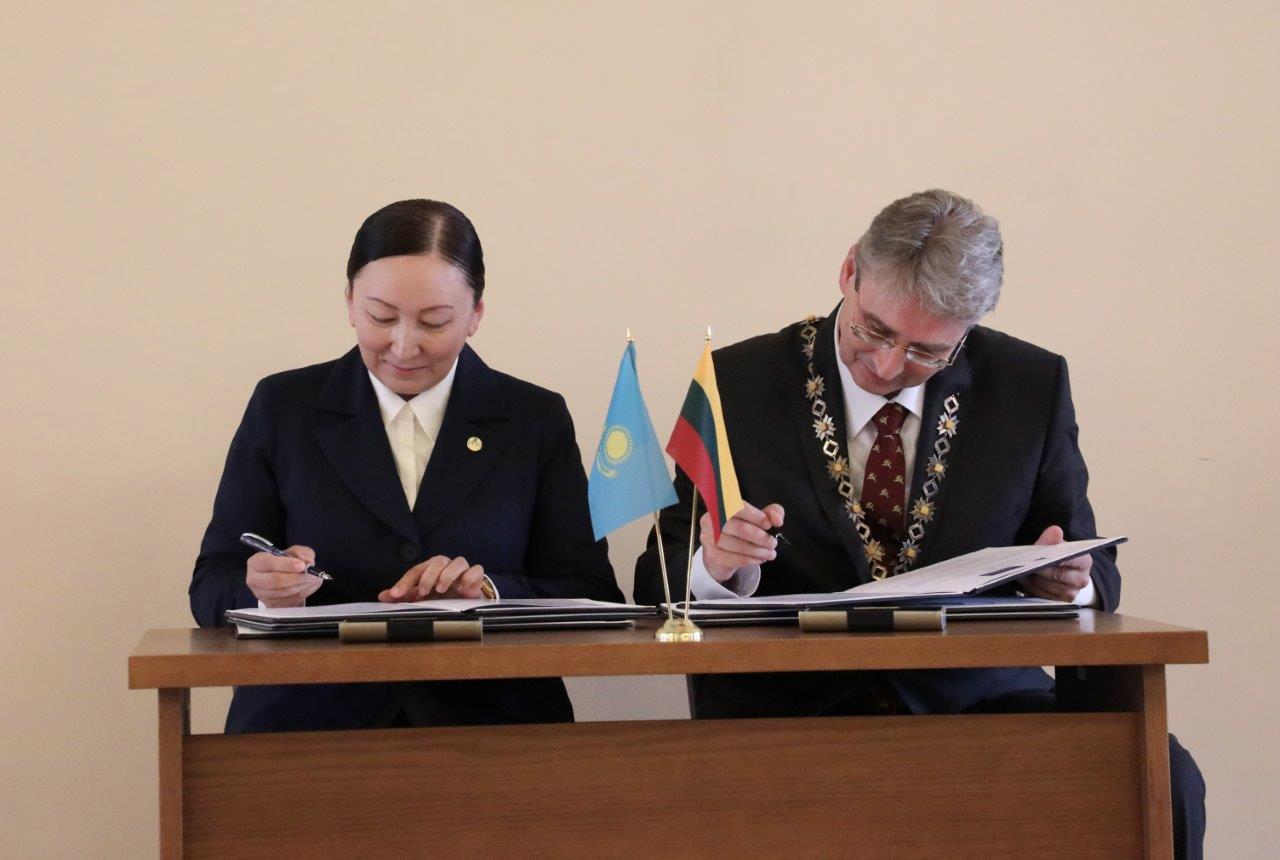
Signing of the Memorandum of Cooperation between the two academies
As many as three new foreign members of the Lithuanian Academy of Sciences were inaugurated at the assembly. They were awarded membership diplomas and badges. The first to deliver his inaugural lecture, ‘Twenty Years of Genetics Research: A Wonderful Journey’, was Prof. Andre Franke from Germany. He said that DNA sequencing in Kiel started quite a long time ago, in 2007. Since then, Prof. Franke has been involved in several genome projects. For example, in the decoding of the genome of the oldest mummy, the ‘ice man’ Ötzi. The investigation shed light on what he ate and even succeeded in reconstructing the genome of the 5000-year-old intestinal bacterium Helicobacter pylori. A genetic risk map for complex diseases (colitis, Crohn's disease, COVID-19) has been developed. Currently, Prof. Franke and his colleagues are conducting research in the T-cell immune response against mould. Mould in cheese is likely to cause various reactions in the body and chronic diseases. It is very important to find out whether these microbes are the cause of such inflammatory diseases. The intention is to establish the Inflammation Excellence Centre.
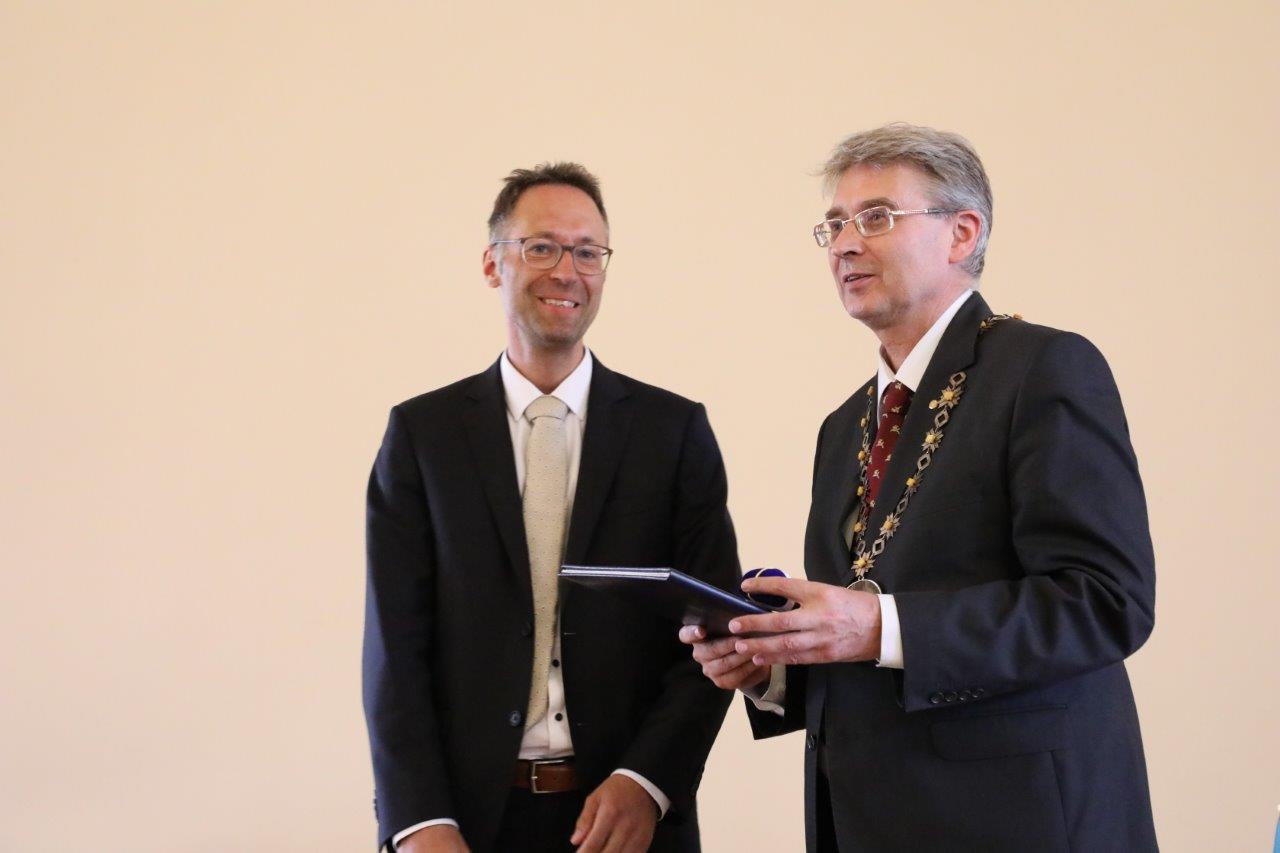
Membership diploma and badge is awarded to Prof. Andre Franke (on the left)
The second speaker was Prof. Abdul Mounem Mouazen, an agricultural scientist from Belgium, who has been collaborating with Vytautas Magnus University for many years. He works in the field of precision agriculture. Centres of precision agriculture have been opened not only in Belgium but also in the United Kingdom. Together with his colleagues, Prof. Mounem Mouazen is developing multi-sensor data fusion systems, modelling interactions between soil and agrotechnology, and investigating how soil changes during cultivation. The development of sensors that analyse the state of soil, the concentrations of different chemical elements and the moisture content is agricultural engineering. He and his colleagues have also developed an on-line multi-sensor platform that collects and analyses such information. It uses hyperspectral cameras, thermal cameras, and LIDAR. The system assesses the ‘health’ of the crop. This allows agrochemicals to be applied with great precision, reducing the amount of fertiliser and pesticides, thus increasing yields and reducing environmental impact. Precision sowing is another important area. Experiments have shown that this can increase the farmer's profit by €400/ha.
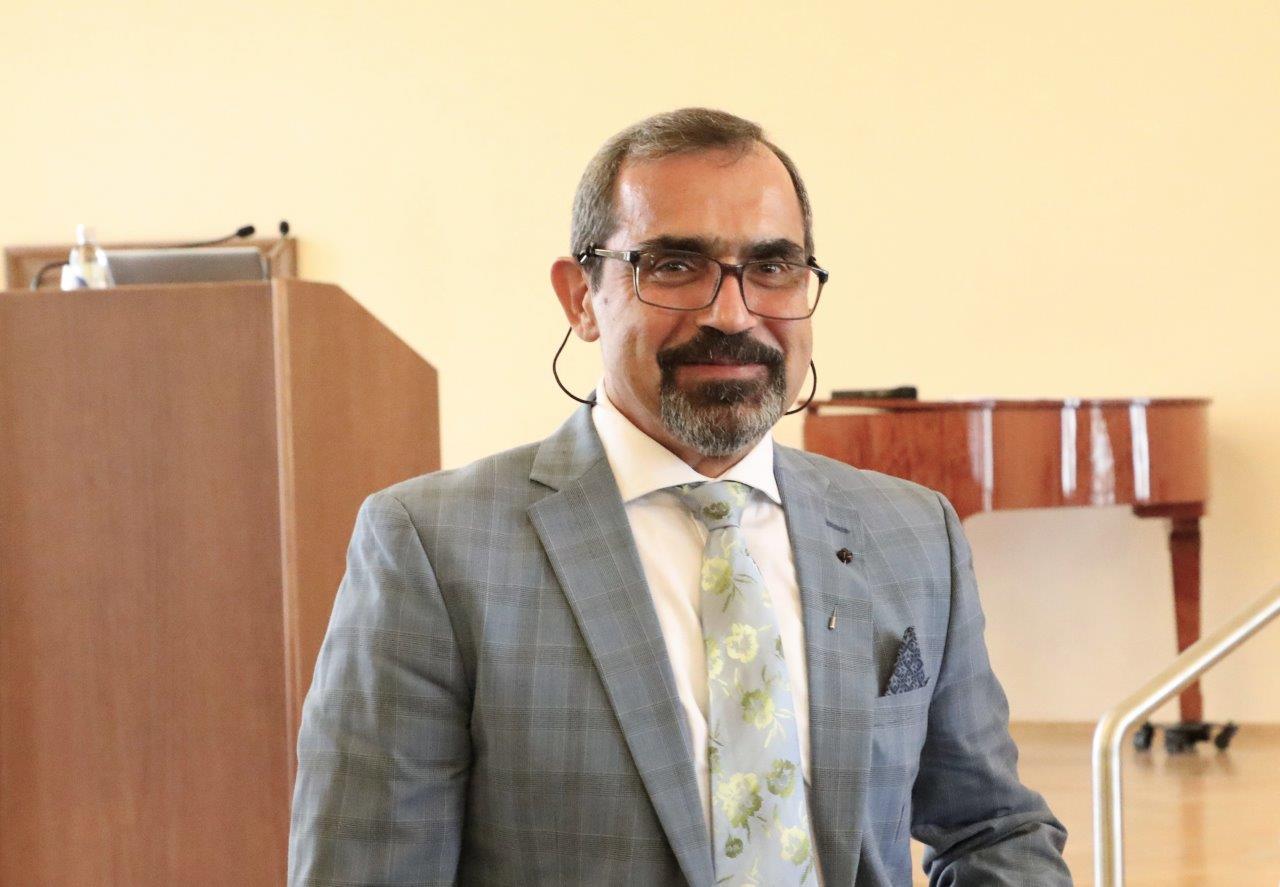
Prof. Abdul Mounem Mouazen
The third inaugurated scientist, Prof. Saulius Kačiulis, is a materials researcher working in Italy. He spoke about ‘Surface analysis methods in materials science’. He started his research career at the Institute of Semiconductor Physics in Vilnius investigating hot electrons. Prof. Kačiulis emphasised that the new generation of materials, which are so needed in various industrial and medical fields, are created by modifying surfaces, in two-dimensional space. Unfortunately, conventional measurement methods are not suitable for measuring such nanostructured surfaces. Photoelectron spectroscopy is therefore the best method, although synchrotron spectroscopy is often needed as well. He and his colleagues have worked on gas and biosensors, analysed metal alloys, composite materials, and biocompatible materials for medicine. Recently, he has been developing methods for the analysis of metal superalloys and two-dimensional materials (nanotubes, fullerenes, graphene, etc.).
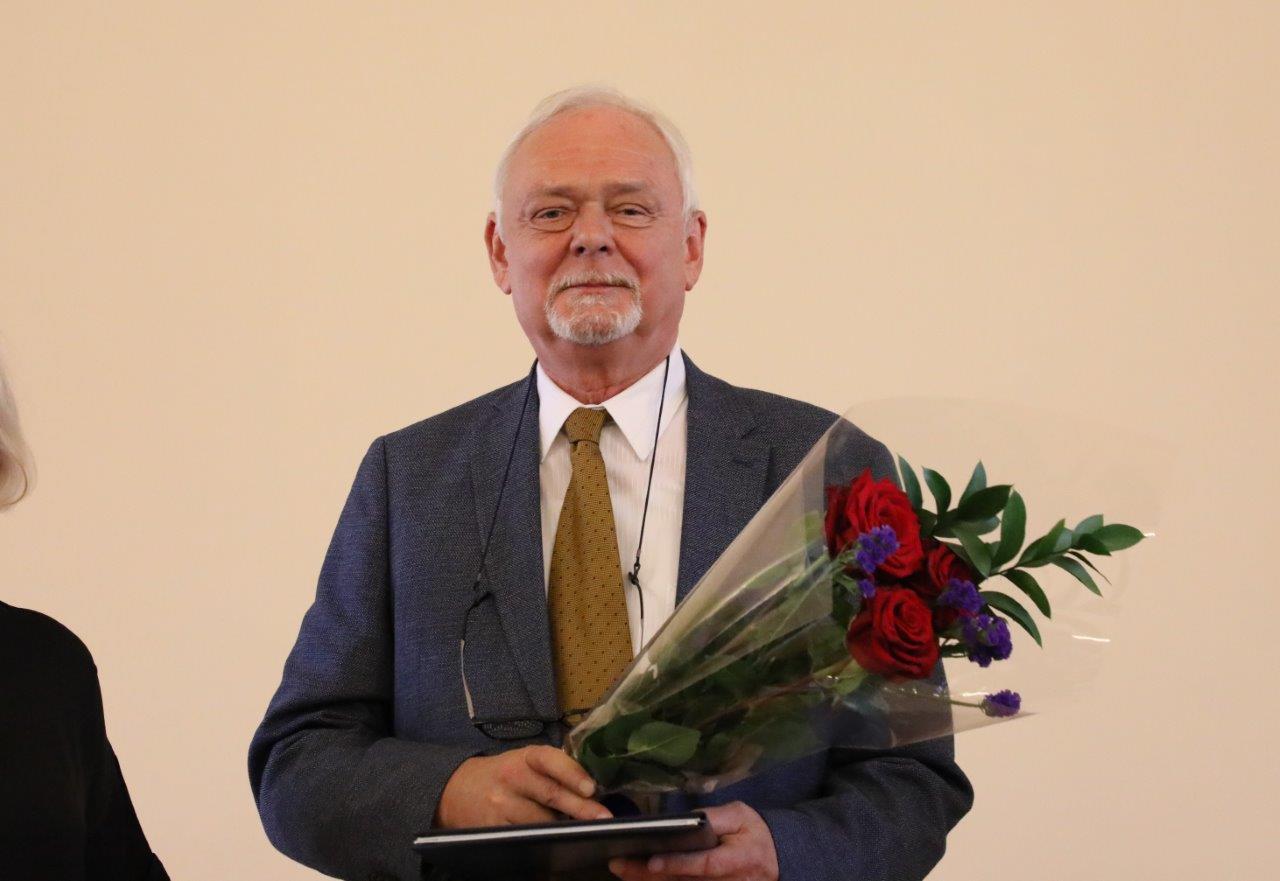
Prof. Saulius Kačiulis
Diego Ungaro, Ambassador of the Republic of Italy, welcomed the fact that scientific links between Italy and Lithuania are actualised by such scientists as Prof. Saulius Kačiulis. By developing our cooperation, we strengthen our competences in the face of growing challenges. He believes that European countries need to work together even more to stand up to global competition. It is therefore encouraging that the UK is rejoining the EU Horizon programme. In conclusion, Mr Ungaro wished the Lithuanian Academy of Sciences great success and to play a prominent role in the development of European and global scientific excellence. Timur Urazaev, Ambassador of Kazakhstan, thanked President Banys and the members of the Academy for signing the Memorandum. He expressed his strong hope that scientific relations between Lithuania and Kazakhstan would develop further, because we all dream of a better and safer world.
The general assembly of the members of the Lithuanian Academy of Sciences concluded with the Academy leadership inviting new members, foreign guests, and ambassadors for a group photo.
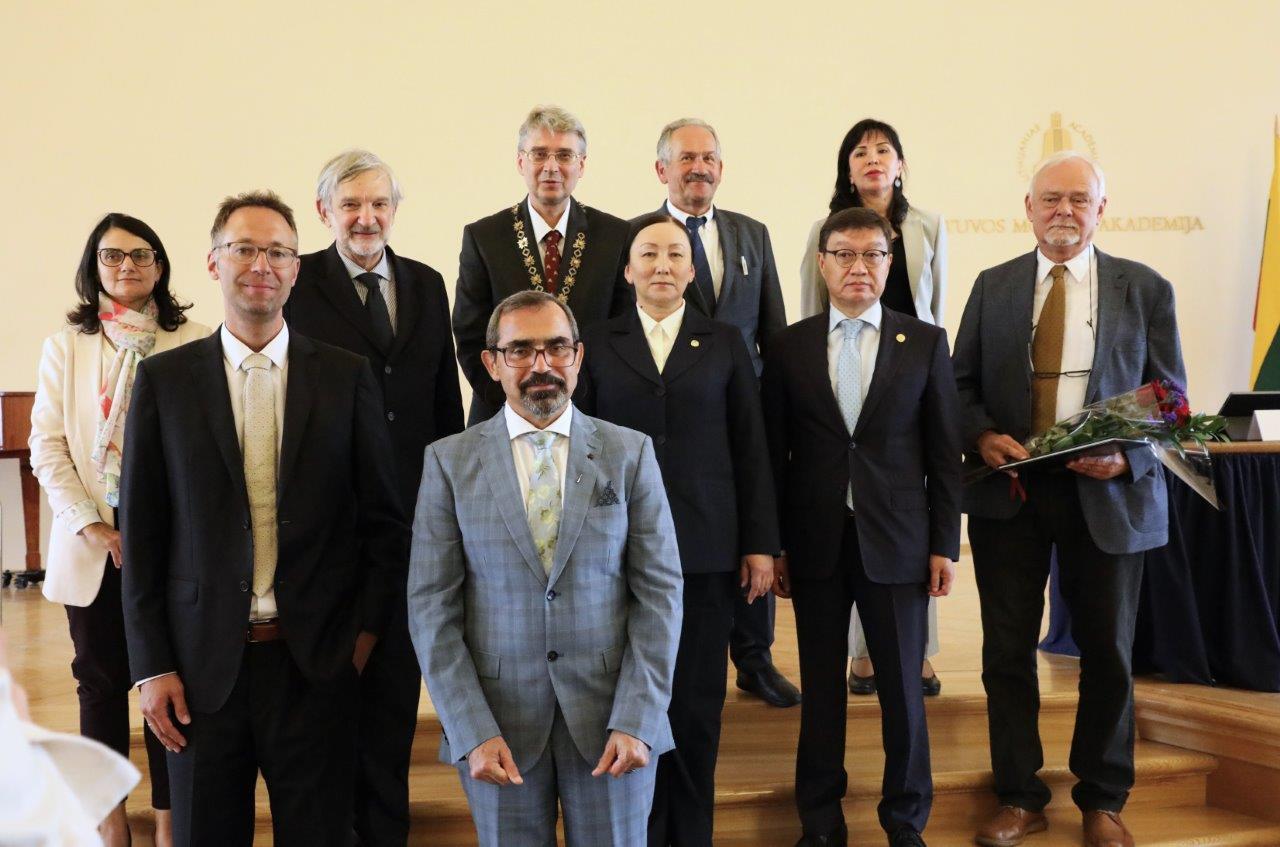
Dr Rolandas Maskoliūnas, Chief Specialist for Public Relations
Photographs by Virginija Valuckienė
Translated by Diana Barnard
